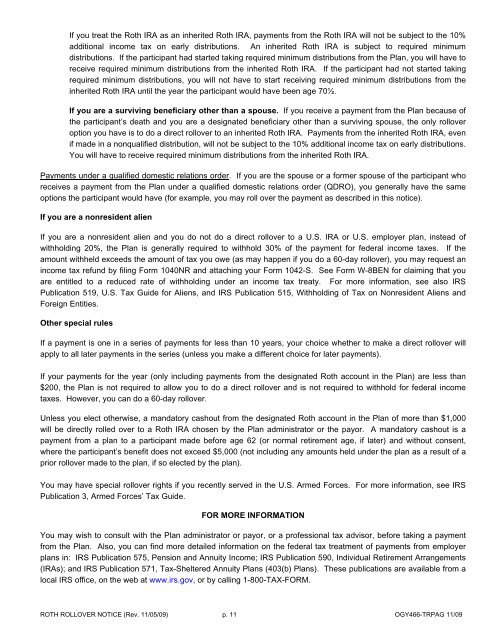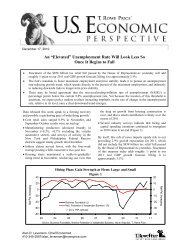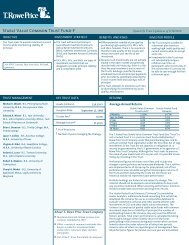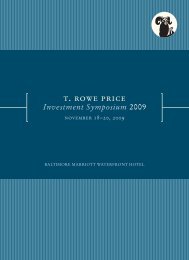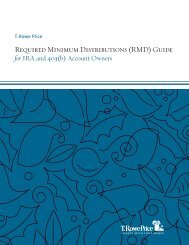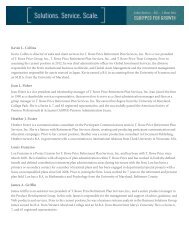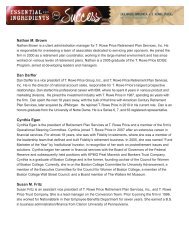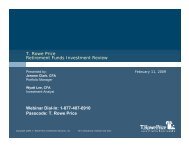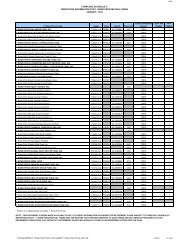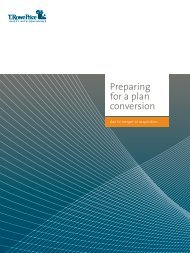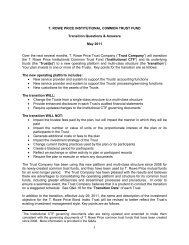YOUR ROLLOVER OPTIONS You are receiving this notice because ...
YOUR ROLLOVER OPTIONS You are receiving this notice because ...
YOUR ROLLOVER OPTIONS You are receiving this notice because ...
- No tags were found...
Create successful ePaper yourself
Turn your PDF publications into a flip-book with our unique Google optimized e-Paper software.
If you treat the Roth IRA as an inherited Roth IRA, payments from the Roth IRA will not be subject to the 10%<br />
additional income tax on early distributions. An inherited Roth IRA is subject to required minimum<br />
distributions. If the participant had started taking required minimum distributions from the Plan, you will have to<br />
receive required minimum distributions from the inherited Roth IRA. If the participant had not started taking<br />
required minimum distributions, you will not have to start <strong>receiving</strong> required minimum distributions from the<br />
inherited Roth IRA until the year the participant would have been age 70½.<br />
If you <strong>are</strong> a surviving beneficiary other than a spouse. If you receive a payment from the Plan <strong>because</strong> of<br />
the participant’s death and you <strong>are</strong> a designated beneficiary other than a surviving spouse, the only rollover<br />
option you have is to do a direct rollover to an inherited Roth IRA. Payments from the inherited Roth IRA, even<br />
if made in a nonqualified distribution, will not be subject to the 10% additional income tax on early distributions.<br />
<strong>You</strong> will have to receive required minimum distributions from the inherited Roth IRA.<br />
Payments under a qualified domestic relations order. If you <strong>are</strong> the spouse or a former spouse of the participant who<br />
receives a payment from the Plan under a qualified domestic relations order (QDRO), you generally have the same<br />
options the participant would have (for example, you may roll over the payment as described in <strong>this</strong> <strong>notice</strong>).<br />
If you <strong>are</strong> a nonresident alien<br />
If you <strong>are</strong> a nonresident alien and you do not do a direct rollover to a U.S. IRA or U.S. employer plan, instead of<br />
withholding 20%, the Plan is generally required to withhold 30% of the payment for federal income taxes. If the<br />
amount withheld exceeds the amount of tax you owe (as may happen if you do a 60-day rollover), you may request an<br />
income tax refund by filing Form 1040NR and attaching your Form 1042-S. See Form W-8BEN for claiming that you<br />
<strong>are</strong> entitled to a reduced rate of withholding under an income tax treaty. For more information, see also IRS<br />
Publication 519, U.S. Tax Guide for Aliens, and IRS Publication 515, Withholding of Tax on Nonresident Aliens and<br />
Foreign Entities.<br />
Other special rules<br />
If a payment is one in a series of payments for less than 10 years, your choice whether to make a direct rollover will<br />
apply to all later payments in the series (unless you make a different choice for later payments).<br />
If your payments for the year (only including payments from the designated Roth account in the Plan) <strong>are</strong> less than<br />
$200, the Plan is not required to allow you to do a direct rollover and is not required to withhold for federal income<br />
taxes. However, you can do a 60-day rollover.<br />
Unless you elect otherwise, a mandatory cashout from the designated Roth account in the Plan of more than $1,000<br />
will be directly rolled over to a Roth IRA chosen by the Plan administrator or the payor. A mandatory cashout is a<br />
payment from a plan to a participant made before age 62 (or normal retirement age, if later) and without consent,<br />
where the participant’s benefit does not exceed $5,000 (not including any amounts held under the plan as a result of a<br />
prior rollover made to the plan, if so elected by the plan).<br />
<strong>You</strong> may have special rollover rights if you recently served in the U.S. Armed Forces. For more information, see IRS<br />
Publication 3, Armed Forces’ Tax Guide.<br />
FOR MORE INFORMATION<br />
<strong>You</strong> may wish to consult with the Plan administrator or payor, or a professional tax advisor, before taking a payment<br />
from the Plan. Also, you can find more detailed information on the federal tax treatment of payments from employer<br />
plans in: IRS Publication 575, Pension and Annuity Income; IRS Publication 590, Individual Retirement Arrangements<br />
(IRAs); and IRS Publication 571, Tax-Sheltered Annuity Plans (403(b) Plans). These publications <strong>are</strong> available from a<br />
local IRS office, on the web at www.irs.gov, or by calling 1-800-TAX-FORM.<br />
ROTH <strong>ROLLOVER</strong> NOTICE (Rev. 11/05/09) p. 11 OGY466-TRPAG 11/09


